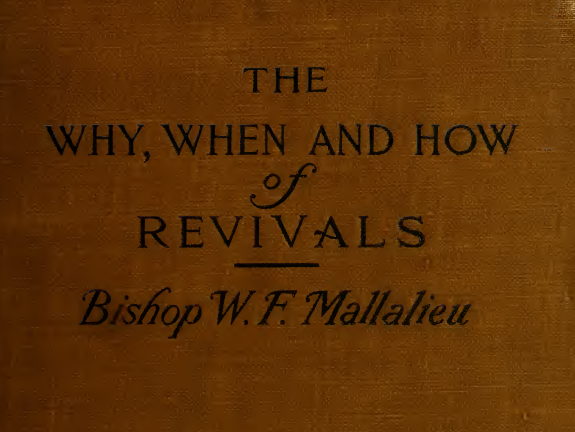O ye of fearful hearts, be strong!
Your downcast eyes and hands lift up!
Ye shall not be forgotten long;
Hope to the end, in Jesus hope!
Tell him ye wait his grace to prove;
And cannot fail, if God is love. — Charles Wesley.
Although the vine its fruit deny,
Although the olive yield no oil,
The withering fig trees droop and die,
The fields elude the tiller’s toil,
The empty stall no herd afford,
And perish all the bleating race,
Yet will I triumph in the Lord,
The God of my salvation praise. —Charles Wesley.
And he said, Take the arrows. And he took them. And he said unto the king of Israel, Smite upon the ground. And he smote thrice, and stayed. And the man of God was wroth with him, and said, Thou shouldest have smitten five or six times; then hadst thou smitten Syria till thou hadst consumed it.— 2 Kings 13:18-19
And let us not be weary in well-doing: for in due season we shall reap, if we faint not. — Galatians 6:9
REVIVAL persistency assumes that the preacher has common sense and makes constant use of all he has in carrying forward the work of God. Good common sense leads the preacher to lay his plans with much thought and wisdom. At least he will be careful to take the choicest part of the year for his revival services and insist that other things shall yield the right of way to the supreme work of the church. Then the preacher will try to know the people, study their peculiar patterns, habits, and notions, and not try to compel abject submission to his opinions and dictates. Usually, the best service can be secured when the men who do the work know they are taken into kind and confidential relations with the pastor in his planning for a revival campaign. Then, the pastor must not fret, fume, or worry; if he does, he will find the church will partake of the same style and become utterly balky.
It will need a moment’s thought to see that the suggested conditions are not spontaneous. They result from well-known and appreciable causes. Revival persistence, first of all, depends upon the personal religious experience of the pastor. Revivals have taken place, and souls have been converted under the labors of backslidden and wicked men. Still, even such men may preach the truth, and such truth has produced fruit. This will not in any degree militate against the idea that a wholly consecrated man, filled with the Spirit and living a holy life, is a more suitable agent through whom the unsaved may be brought to Christ. With such an experience, let the pastor go about his work as the hand of Providence shall point out the way. The people must be visited, and direct personal effort must be employed. If the people are well, call on them. If they are sick, call on them all the more, and this work should be done systematically and thoroughly, and every faithful pastor will do it. Let him persist; the people will be well after a while, and then circumstances will be favorable. Some official board members may not fully sympathize with the movement; they are frozen Christians.
Let the preacher persist; the sun will melt mountains of ice if it has time and opportunity. It may be that a sudden quarrel arises in the choir, and harps by the dozen are hung upon the willows, and the singers will not come up to the help of the Lord. Very well. “Let those who refuse to sing who never knew our God,” but be it known that a genuine revival is not made up of singing. Let the preacher persist, singing or no singing. It may be that various distractions altogether unexpected and not in any way helpful may arise. There is the danger that the attention of the people may be diverted. Never mind; the preacher has unshakable faith, and unshakable faith means steady salvation. Let the preacher persist, and the work will continue; for “it is not by might nor by power” that revival services are to be sustained but by the outpouring of the Spirit upon saints and sinners. This grace comes in answer to real, believing prayer which goes up to the throne from consecrated and baptized souls.
Revival persistency! That does not necessarily mean that ten or a dozen services should be held weekly for six months without interruption. Still, it does mean that once wisely planned revival services have been commenced, they should be steadily continued until crowned with victory or a clear providential indication points to their termination.
By Bishop W. F. Mallalieu
Updated 2023 Nathan Zipfel

